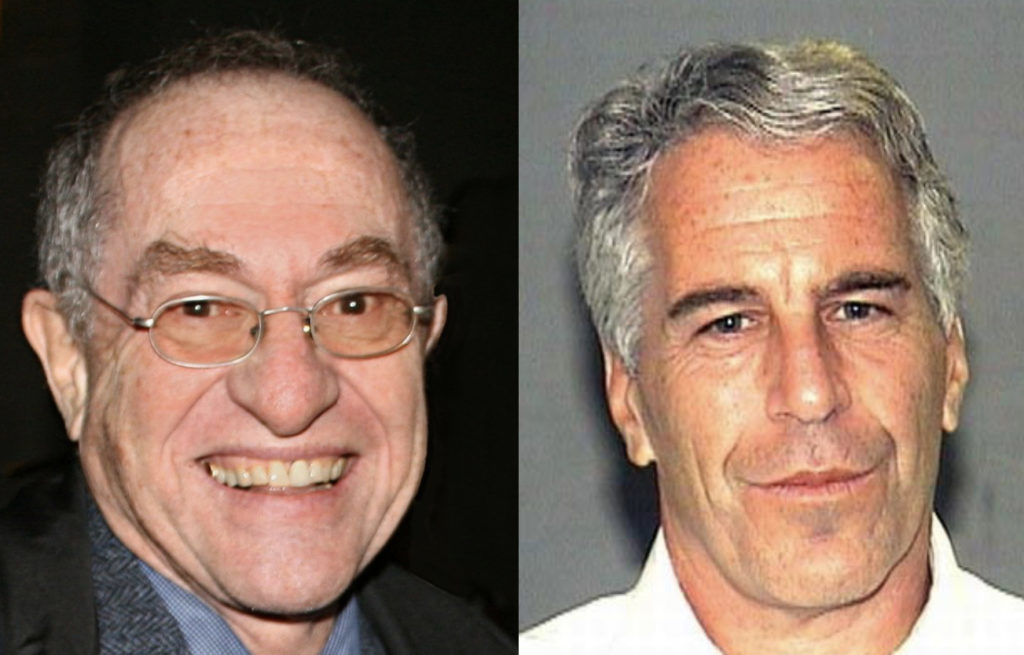Hey Alan Dershowitz, defend this!

It’s said that when you first meet Alan Dershowitz it will take him all of five minutes to mention he’s a professor (now emeritus) at Harvard. You would think someone who is bright enough to teach there (he’s also a Yale Law School graduate) would recall that America is a nation that’s getting a little weary of braggadocio, particularly in older white men. But no matter. If that was the worst one could say about America’s most famous Constitutional appellate lawyer one could probably write the whole thing off as a harmless foible.
Yes, I can forget and even forgive the odd academic conceit. What I can’t forgive is his horrific record of defending the perfectly awful. Indeed, it’s not my place to forgive him, it’s the place of the victims of his clients. And since many of them are dead, it’s not a forgiveness that will be forthcoming any time soon.
Here’s a list of the horribles defended by Alan Dershowitz: Claus von Bulow, OJ Simpson, Harvey Weinstein, Jeffrey Epstein, and now Donald Trump. Are you starting to see a pattern? Let me help you out: two wife murderers, a rapist, a child sex trafficker and a rapist, and a malicious misogynyist, sexual assailant and a rapist. Maybe Dersh keeps mentioning Harvard because he’s trying to distract from the real problem here, that he’s a raging woman hater.
But let’s not forget, Dersh is also a Constitutional Lawyer — from Harvard no less — and he’s passionate about Constitutional violations. So hold your nose for a moment and let’s take a look at that.
Dershowitz believes he has an answer to why abuse of power is not an impeachable offense. It is argued that it is, because Alexander Hamilton defines abuse of power in Federalist 65 as, “the abuse or violation of some public trust. They are of a nature which may with peculiar propriety be denominated POLITICAL, as they relate chiefly to injuries done immediately to the society itself.” But Hamilton goes on to say, “The prosecution of them, for this reason, will seldom fail to agitate the passions of the whole community, and to divide it into parties more or less friendly or inimical to the accused. In many cases it will connect itself with the pre-existing factions, and will enlist all their animosities, partialities, influence, and interest on one side or on the other; and in such cases there will always be the greatest danger that the decision will be regulated more by the comparative strength of parties, than by the real demonstrations of innocence or guilt.”
This seems to argue in Dershowitz’ favor, that is, Hamilton appears to be leading the reader to the conclusion that because such instances of the violation of public trust (in the form of abuse of power) are so inherently POLITICAL in nature, it is necessarily impossible to prosecute judiciously, and should be left out of impeachment proceedings because it will lead to abuse of process by factions that will inevitably form on that account.
But wait, as they used to say in the old Veg-a-matic commercials, there’s more! Hamilton goes on to say that “The convention, it appears, thought the Senate the most fit depositary of this important trust. Those who can best discern the intrinsic difficulty of the thing, will be least hasty in condemning that opinion, and will be most inclined to allow due weight to the arguments which may be supposed to have produced it.” In other words, Hamilton is saying that, yes, it can get political, but abuse of power is nevertheless so inimical to the public trust that it simply must be dealt with. Who better than the Senate to take it on? Of course, Hamilton was no fool, and he understood that the Senate would also be divisive. But he felt that august body was nonetheless the best in the world to deal with the question, and it was the lesser of two evils to tackle it somewhere rather than tackle it not at all.
The coming trial in the Senate of Donald Trump is a case in point. Of course, barring a miracle, Trump almost certainly will be acquitted. But at the very least his crimes will be laid out for all to see, and in so doing the hypocrisy of the Republicans in the Senate will be exposed. Thus, Hamilton was right. Even with a bad result we will be getting a good eventual outcome, because bad Senators will be exposed to the scrutiny of history, and their evil will serve as a cautionary tale to men and women in the future who chose to follow their nefarious course.
Dersh may be a hotshot professor emeritus at Hah-vud, but I think he’s missed the boat here, and I think he knows it. He just thinks we’ll read as far as our little brains will let us in Federalist 65 and stop. He’s hoping we will, anyway. But he’s wrong. And in case you didn’t know, Dershowitz has written a book, a jeremiad against the #MeToo movement called “Guilt by Association.” So just as a final reminder, Dersh is also a loathsome woman hater.

Robert Harrington is an American expat living in Britain. He is a portrait painter.
